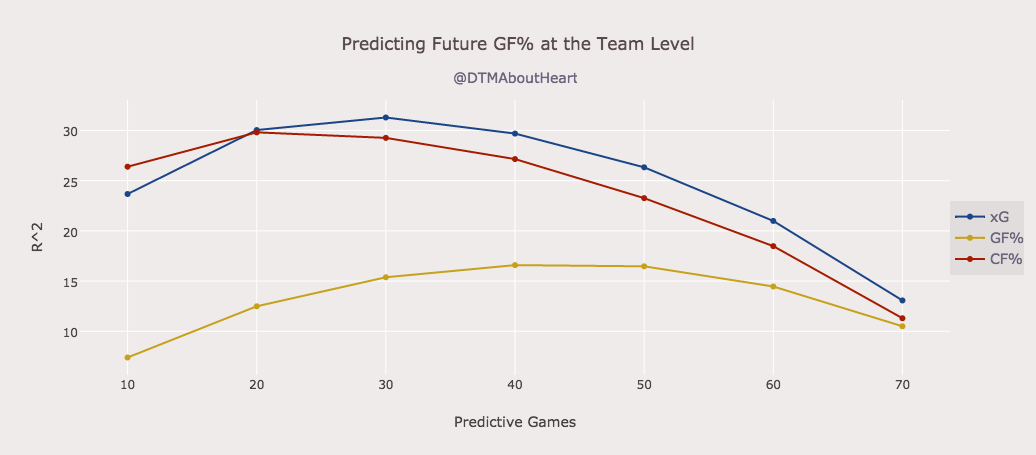Quote:
Originally Posted by Itse

Incorrect. Goal differential is the 2nd best indicator of future success. Standings are the best.
|

At the 30-game mark, Corsi and Expected Goals have around double the correlation with future Goal Differential. Again, key point is
future goal differential. As in, goal differential in games 31-82.
Goal differential and standings are only better indicators for the season as a whole. Which should be obvious, considering you're using that as a model to "make predictions" on results that are 40% in the past. At an individual game level, it's like waiting until the end of the first period and betting on the team with the lead - no #### that's gonna outperform any statistical model.
But if you just assume that ranking the teams 1-31 in the standings will perfectly mirror a 1-31 ranking in quality of play, that's just lazy. Any idiot can check the standings and see we're out of the playoffs. Yet, some teams that are out will find a way to get in, and some teams that are in will drop out. Surely you can concede that it's at least
possible for a team to play better or worse than their record.
Quote:
Here's the major problem with predicting that the Flames should have more success; it ignores the added context of goal differential and points.
There are currently 9 teams with a goal differential at least 11 goals better than ours in our conference, and all teams in our division currently above the playoff line have at least 19 goals better goal differential. That's a pretty big gap in just 32 games.
Those numbers suggest that really we're already lucky to not be further behind in points.. A team that has let in more goals than it has scored should have more losses than wins. (Those who haven't checked the standings, We're currently tied in wins and losses.)
In other words, we need to score more goals and let in less goals just to keep our current pace, and our current pace is projecting to be about 7 points short of a playoff spot. That's one reason fancy stats suggesting we should score somewhat more and let in somewhat fewer goals don't comfort me that much.
|
So, what do you propose we change? Should Gulutzan walk into the dressing room and write "Score more goals" on the whiteboard? Why can you say "based on our goals we're lucky not to have fewer points," but we can't say "based on our play, we're unlucky not to have more goals"?
To quote Nate Silver: "I'm not sure that hockey is that much different than random." The better team loses far more often in hockey than in any other professional sport.
Quote:
|
(Plus there's the problem that "chances" and "dangerous chances" are pretty arbitrary stats to begin with.)
|
That's why we have xG models - they quantify exactly how dangerous every individual chance is. Ten 2% chances are just as good as one 20% chance, in theory.